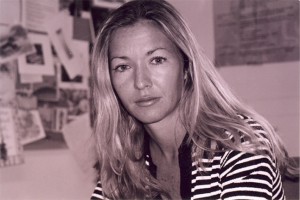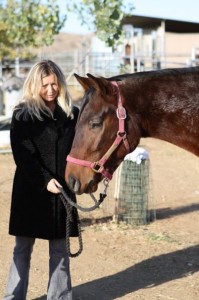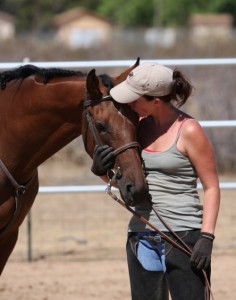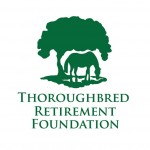In her professional portrait at the University of Southern California, economist Caroline Betts looks every inch the polished academic.
A keen intelligence seems to radiate from her level gaze; and, it’s not hard to imagine this woman earning her doctoral degree in economics from the University of British Columbia, and the years of research and grueling publishing cycle to follow.
What can’t be guessed at by examining her academic credentials and course schedule is a different passion, which exists in a part of her life far from air-conditioned lecture halls and international macroeconomics.
It is at hot, dusty horse auctions where Betts can be found in her off hours, saving doomed horses.
Betts founded the Southern California Thoroughbred Rescue in June 2008, and specializes in rescuing ex-racehorse Thoroughbreds from auction and transitioning them into new homes, foster care, and future disciplines.
“I dread it every month, to this day,” she says. “But we miss very few of them. Because I’ve found that even when we’re in no position to take on additional horses, we find a way to help. But you have to show up in order to get the information and get the word out.”
In just two years, Betts has organized a network of supporters, including trainers, volunteers and financial donors, to successfully rescue 70 off-track Thoroughbreds from slaughter, and facilitate the rescue of roughly 30 others.
The duality of life doesn’t leave much time for much else. But that’s fine with Betts.
“There’s never a second in the day when there’s nothing to do,” she says. “I don’t take days off, but it’s okay. Everything I’m doing is very rewarding.
“I love my academic research and my grad teaching, and I’m doing something with horses that is far and away the most rewarding thing I’ve ever done with horses in my life.”
Like many young girls from England, Betts grew up taking lessons. Never in the financial position to own a horse, she kept up with her weekly lessons until the rigors of college interceded.
For about ten years, she set aside the horses to doggedly pursue her studies. She earned her undergraduate degree from the University of Durham in England, her master’s degree from Queens University in Canada, and her doctorate from University of British Columbia, Canada.
Along the way, she has authored numerous publications and taught in the field of international macroeconomics, international finance and macroeconomic theory. And has won numerous awards and served on many professional boards.
Shortly after accepting a position at University of Southern California, Betts got back into riding. Taking lessons on off-track Thoroughbreds from the local riding circuit. On Thoroughbreds, her early fond memories of being taken to races in England were reawakened.
Acknowledging that the Thoroughbred in England has a much better reputation as a riding horse than it does here, Betts says she always felt a deep connection with the breed.
“When I rode as a child, there were no Quarter Horses and although there were Warmbloods, the Thoroughbred was the primary breed for all disciplines,” Betts says. “My friends who owned their own horses had Thoroughbreds” and when it came time for her to buy, she also chose Thoroughbreds.
And with horse ownership, and a decision to move to the horse-friendly community of Norco, where there exist more bridle paths than sidewalks, she also learned more about horse slaughter. Already aware of the issue, her knowledge deepened when she moved into a horse hub so close to auctions.
“I live a short drive from low-end auction houses where a lot of young, ex-racehorses wind up,” she explains.
Unable to resist getting involved, Betts volunteered with Thoroughbred retirement facility, Tranquility Farm before deciding to found her own rescue.
Although she can’t save them all, she maintains rescues at three facilities. Horses are rehabbed from injury, retrained, and eventually re-homed.
On her website, she lists many successes, including her second rescue horse, Careful Haste.
Hasty, as he is known, was retrained by volunteer and nonprofit director Jacqueline Poe and went on to a “wonderful, wonderful home.”
Yet when one horse finds a good situation, there are so many others just waiting. Waiting to be spotted at the auction house.
“We just rescued 12 Thoroughbreds. And it’s difficult to do because you have just a few hours to put together the money to purchase them, and the space to house them,” Betts says. “But with each horse we try to put the word out to see if there’s anybody out there who cares about a particular horse.”
“A lot of times, somebody does.”






Wonderful article. 🙂 Bravo to both Caroline and Sue!
Thank you Kim!! It must be the passion for both her academic and equine pursuits that keeps Caroline on her toes. Maybe a ton of coffee too? Anyway, I always love finding people who are doing horse work while maintaining careers outside the equine industry because I think it shows how people in all areas care about horses. It makes Thoroughbreds seem less exclusive to one small niche.